Turkey vultures are large, somewhat scary-looking birds with a penchant for noise, property destruction, and leaving carcasses lying around.
While they are protected by law for their important role in the environment, it’s understandable why people wouldn’t want them around their homes.
Here are the best tips on how to get rid of turkey vultures effectively and humanely.
1. Scare turkey vultures with sonic cannon
Turkey vultures are protected from state laws, so you cannot fire weapons at them to scare them away. However, a sonic cannon does just that, except with no harm done to these birds.
True to its name, this propane-powered device fires extremely loud blasts of sound to scare away pests from your property. Note that this is best used if you want to scare away buzzards from vast, outdoor spaces.
The boom it produces is 130-decibels loud that can scare birds up to 10 acres away–so you’ll likely have neighbors knocking down your door if you use this in the suburbs. Note that a sonic cannon is not a passive method of getting rid of buzzards.

It does come with adjustable settings so you can choose the time ranges between each shot, but you will need to manually turn it on.
When you see turkey vultures circling overhead or start seeing them land on your property, it’s time to give this baby a go. One boom is enough to send them scrambling away, and they wouldn’t want to come back with the blasts going off from your home.
You can choose the 1-10 minute setting if you want closer-spaced booms or the 5-30 minute setting if you want them spaced out. Either way, the unpredictable schedule of sounds will be enough to get rid of buzzards roosting in trees, telephone lines, roofs, or ledges in your vicinity.
2. Install electrified bird-shock tracks
Buzzard birds are just like any other avian species in that they like having places to roost. They prefer high, secluded places from where they can survey their surroundings.
If you have turkey vultures on the roof, parapet, ledges, air conditioning units, or other parts of your home, then you’ll want to install some kind of vulture deterrent as soon as possible.
But because these birds are heavy and strong, they’re pretty good at destroying most anti-bird devices. But one thing that has proven effective is bird shock tape.
This roll of tape might look like your regular adhesive tape from the supply store, but the difference is that it’s able to conduct electricity.
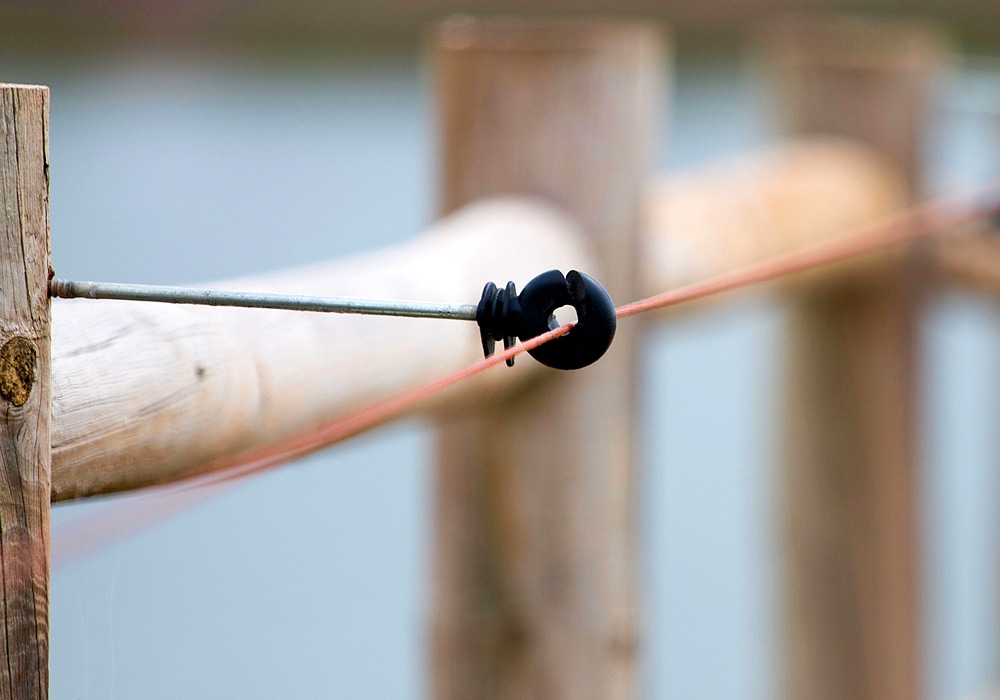
It has metal leads running through its length. You’ll need to get a bird shock charger to give the tape its bite.
Simply unroll the tape and smooth it over turkey vultures roosting spots and install the charger. Turn it on and watch as the vulture birds attempt to perch. The electric shock is not enough to hurt them, but it will shock them into flying off.
Bird shock tape is the Best turkey vulture deterrent because it’s both effective and cost-effective. Buzzards come in large numbers, so you’ll need to protect a wide area. A roll of bird shock tape can protect 50 feet worth of roosting space from destructive vultures roosting.
3. Install a motion-activated sprinkler system
Turkey vultures don’t like to be sprayed with random jets of water any more than we do. If you want a non-toxic turkey repellent, you can’t get safer than good old H2O.
But remember that water only becomes the world’s best buzzard repellent if it comes with the element of surprise.
A constant shower of water isn’t going to scare these birds away. That’s why your best bet is a motion-activated sprinkler system.
Motion-activated sprinklers can sense movements from up to 30 feet away and protect 1200 square feet nearest them from day to night.
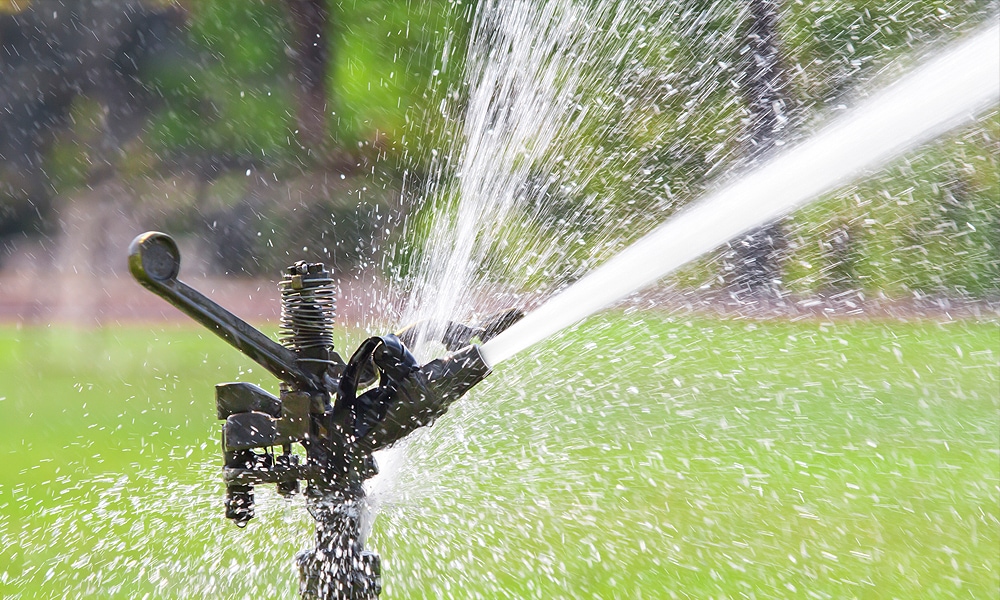
This makes it ideal for turkey vultures who like to swoop low, nest in the ground, and feed on carcasses on the ground.
You can adjust the sensitivity of the device if you don’t want it going off at every gust of wind. You can also adjust the spraying distance and direction to make sure that you don’t get wet as you walk through your garden path.
To install, you need to hook up the sprinkler system to a hose with line pressure. Then turn it on, and voila! A non-toxic turkey repellent that keeps your yard clean and green.
4. Repel vultures with a scarecrow kite
If you want to deter buzzards from laying a single feather on your property, you can use a realistic scarecrow kite.
If you notice turkey vultures circling over your home, install this as a signal to stay away, and you’ll see them readily obey.
You might think that any kite flying above your property will do the trick, but there are distinct advantages to using a scarecrow kit.
These are designed to scare away turkey vultures by using visual cues to remind them of birds of prey.
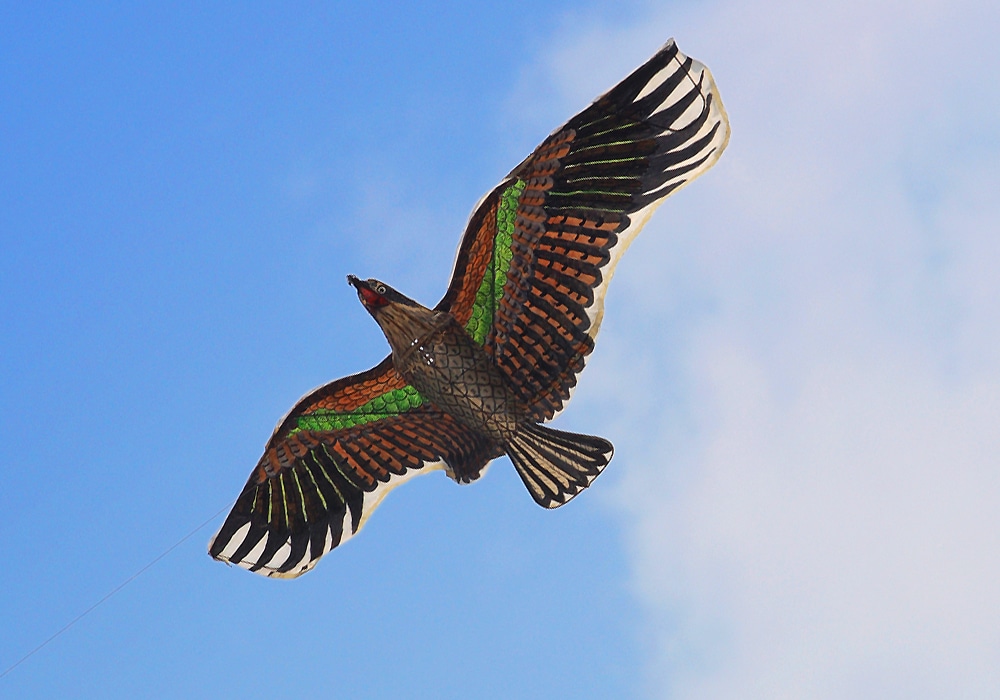
The use of bright, reflective colors, eye-like patterns, and a bird-shaped silhouette will make your home look like it is protected by a dangerous predator that turkey vultures would not want to mess around with.
This particular buzzard deterrent is effective even from far away.
These kites are made for outdoor use with a 6-meter long, strong and stable telescopic pole and an aerodynamic design that allows it to stay flying even on less windy days.
But when the weather is bad, give your bird kite a rest to avoid it from getting blow away.
5. Intimidate with vulture distress sounds
Birds make use of their keen sense of hearing to avoid areas of danger. Threatening sounds from predators and avian distress calls frighten them away. You can use their fear to your advantage.
Does that mean you will need to put birds of prey in your home to make scary sounds? Does it mean you need some kind of turkey repellent spray or liquid fence turkey repellent to make a captured buzzard cry out in pain?
Thankfully, no! Aside from being a soul-scarring violation of environmental protection laws, it would also be unsustainable and inconvenient. Instead, use an electronic anti-bird sound repelling device.
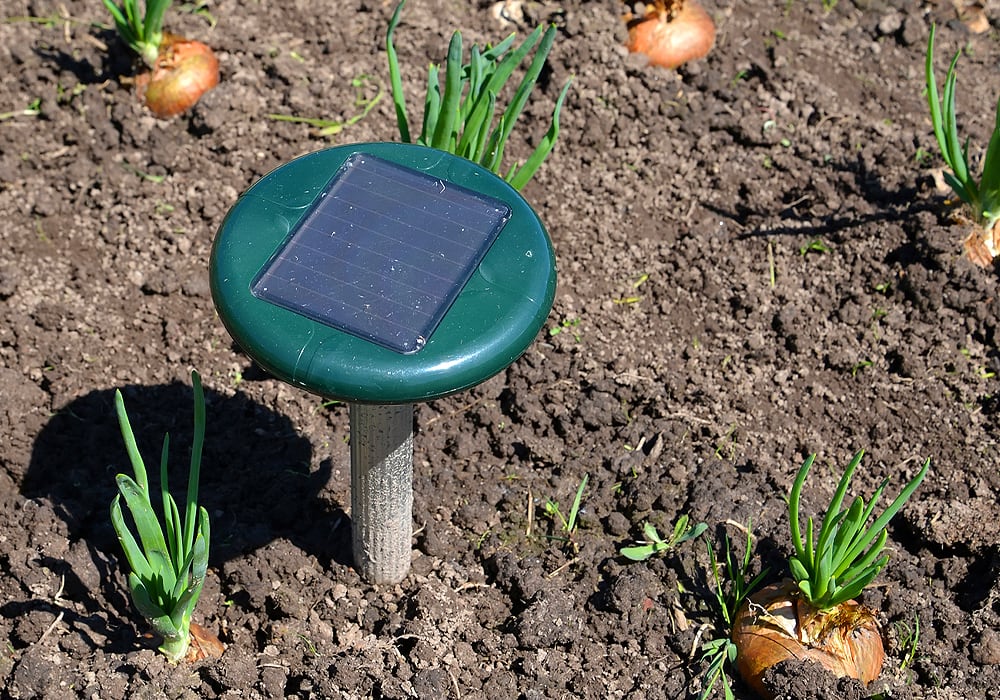
This device emits pre-recorded sounds of different predators and birds in distress. The sounds are in a rotation, so the vultures will think your home is some kind of den for everything dangerous to them.
Once turned on, the sounds are played intermittently, so birds don’t get acclimatized to it. There are volume settings that you can adjust according to the size of the area you are trying to protect.
This is effective at dissuading buzzards nesting and roosting in your home. They would not want to raise their young or hang out in a dangerous neighborhood. This method is great if you feel like visual anti-bird devices will take away from the beauty of your home.
6. Install buzzard roosting spikes
Another way to get rid of turkey vultures on roof is to install roosting spikes. The rods jut out, rendering your ledges and roofs unviable for perching.
This works especially well for these big birds. Buzzards have weak feet, as evidenced by their sole reliance on their sharp, curved beak to tear apart dead animals.
They need a relatively large piece of a ledge to grab on to for stability.
The thin roosting spikes are much too small for buzzards to grasp. And even if they did manage to hold on, they’d be poked by the spikes every time they moved, making for an uncomfortable experience.
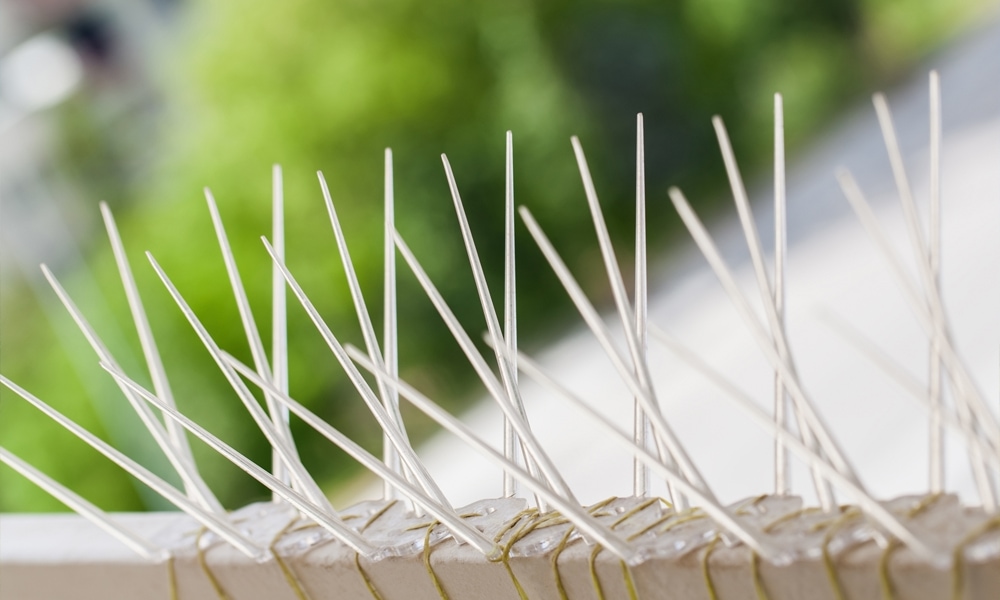
Roosting spikes come in segments with three or four rods. You can space them out on your ledge to cover more area, but make sure space in between segments isn’t big enough for a turkey vulture to comfortably perch on.
To install, use caulk or outdoor glue and apply on the base and on the ledge that you want to stick it on. Then press it firmly for a few minutes to set, and you’re done!
Note that you will need to protect all the surfaces that turkey birds could possibly roost on. If they find that your roof has roosting spikes, they’ll just congregate in another part of your home that doesn’t.
7. Deter vultures with scarecrow owl decoys
If you want to know how to get rid of buzzards, find out what they’re scared of. These birds may be large and loud, but they cower under the shadow of eagles and owls.
They would not want to nest or roost anywhere that birds of prey like to frequent. You can take advantage of their fear by using scarecrow owl decoys.
These can be found in your gardening and home improvement stores. There are a lot of brands, but make sure you get one that is as realistic-looking as possible. It should at least be 3D and lifesize.
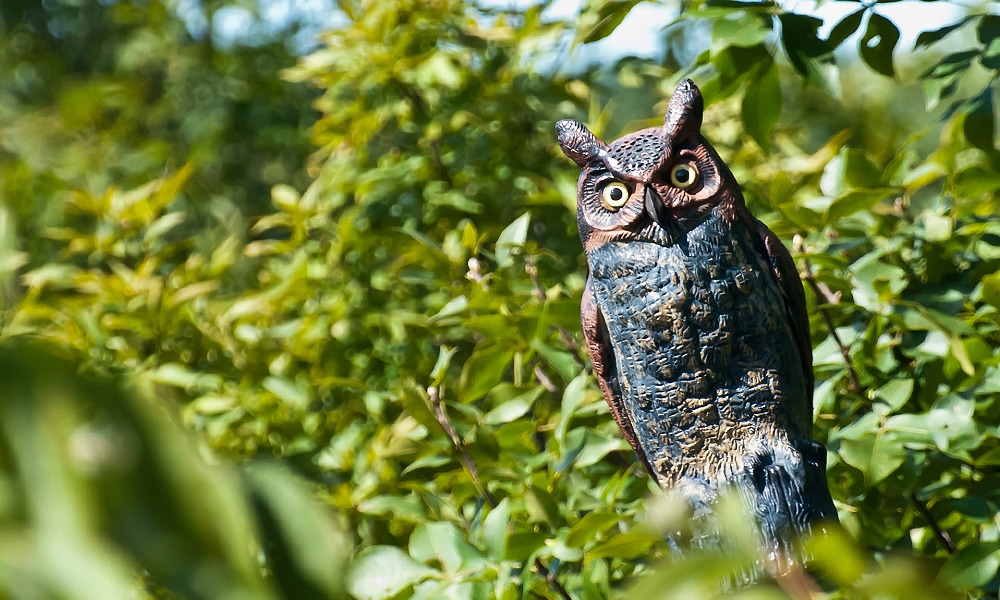
Preferably, it will move unpredictably in some way. A lot of owl decoys use wind or solar energy to rotate their heads the way real owls do.
Some even have red flashing lights coming out from their eyes, which helps protect your property even at night. To get rid of turkey vultures, install an owl decoy or two in the areas that they frequent.
As much as possible, position them according to an owl’s natural behavior–either up in the trees or on your roof. Be sure to move it around every 3-5 days to help reinforce the idea that they’re live owls.
8. Scare vultures with reflection
All birds are put off by bright flashes of light. It disorients them, confuses them, and scares them away.
Vulture birds are no different. You can use reflective material to get rid of vultures hanging out in your home.
The good thing about this turkey deterrent method is that it’s easy to DIY.
You can crush balls of foil and hang them from the tops of tree branches like Christmas ornaments (although you can bet those birds won’t feel too merry about it).
You can hang old CDs or small mirrors across your yard to prevent them from touching down.

If you don’t feel like DIY-ing, it’s easy to find ready-made bird deterrents for your home.
We like these hanging reflective spirals because their multiple facets allow them to reflect light from all directions and their design maximizes air drafts, allowing them to spin at the slightest breeze.
On the other hand, this sleek reflective bird deterrent acts like a wind vane, with special cups to catch the wind, spinning it around in dizzying flashes of light.
Simply install them where the sunlight and streetlights hit, and sit back and watch them get rid of buzzards in your yard.
9. Install a bird net
To keep vultures away from your trees and your home, consider using turkey netting. Bird netting is available in your gardening and home improvement sections, but make sure to buy something heavy-duty.
The birds you are trying to detract are strong and heavy, so pick an appropriate material. Polyethylene twine is a great choice because it’s durable enough to withstand the buzzard’s strength and weight, and it isn’t as obvious as other bird netting materials out there.
If the turkey vulture invasion is ruining your home by eating caulk joints, attacking your roof, and depositing large, acidic bird droppings all over your home, this is a good way to stop it.
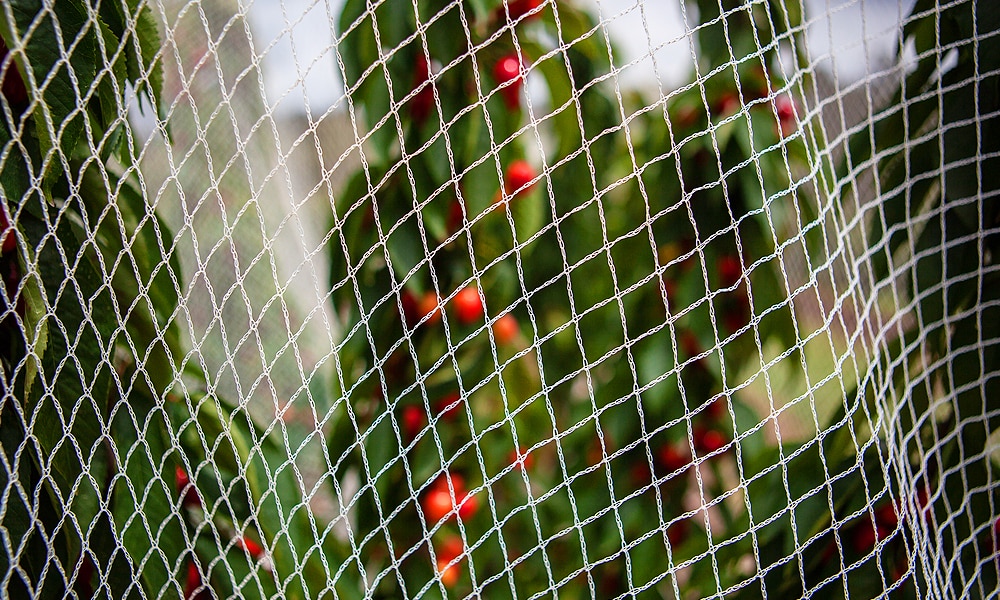
By preventing access to these areas, the buzzards won’t be able to destroy them. This is also a good choice if you want to get rid of turkey buzzards that are roosting on your trees.
Buzzard netting will take time, effort, and resources to install, but if done properly, the effect will last a long time. Be sure to install the bird netting to tent over the structure you are trying to protect.
Leave at least a foot in between the netting and the structure’s surface to maximize its efficiency. By using the principle of physical exclusion, you can get rid of roosting turkey vultures.
10. Remove any carrion asap
If you have ever wondered, “why are vultures hanging around my house?” check your surroundings for any dead animal carcasses.
Turkey vultures are carrion eaters. They look for freshly killed animals–usually, leftovers from another predator–and have a feast.
You might have foxes, eagles, owls, or other predators leaving their half-eaten food around your property.
You might even have a dead buzzard in your backyard. Wherever the meat comes from, make sure to remove them as soon as you can to prevent buzzards from flocking for the buffet.
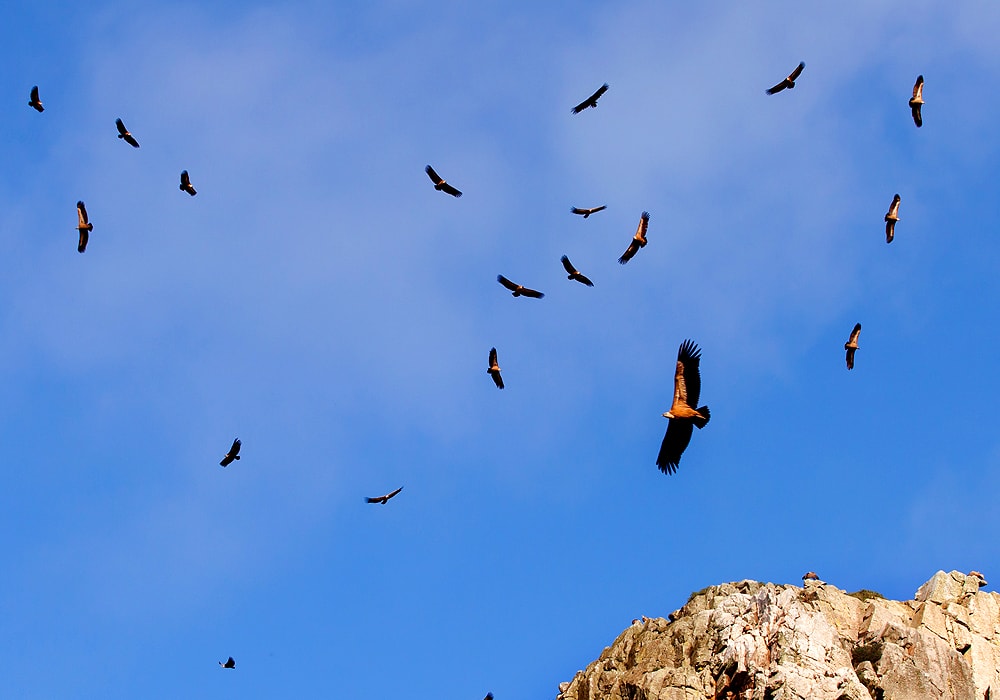
Proper carcass disposal is very important in order to avoid scavengers. You can drive it to your landfill but call ahead of time to let them know that you have a carcass.
There are many landfills that have special conditions for the removal of dead animals.
You may also consider burying the carrion yourself. Wrap the carcass in a plastic bag and choose a spot far from any water sources of electrical lines.
Dig a hole that allows at least two feet of soil in between the surface of the buried carcass and the surface of the soil.
Sprinkling a little lime–the ones used to fertilize gardens works perfectly–on top of the body before covering it up will help to speed up the decomposition process.
11. Remove buzzard roosting options
If you’re wondering how to get rid of turkey vultures, you might want to spend a couple of minutes every day observing them.
Watching what they do and where they do it is indispensable knowledge in the fight to keep buzzards away from your home.
One of the most important things you’ll want to find out is where they like to hang out. This tells you where to target your anti-buzzard strategies.
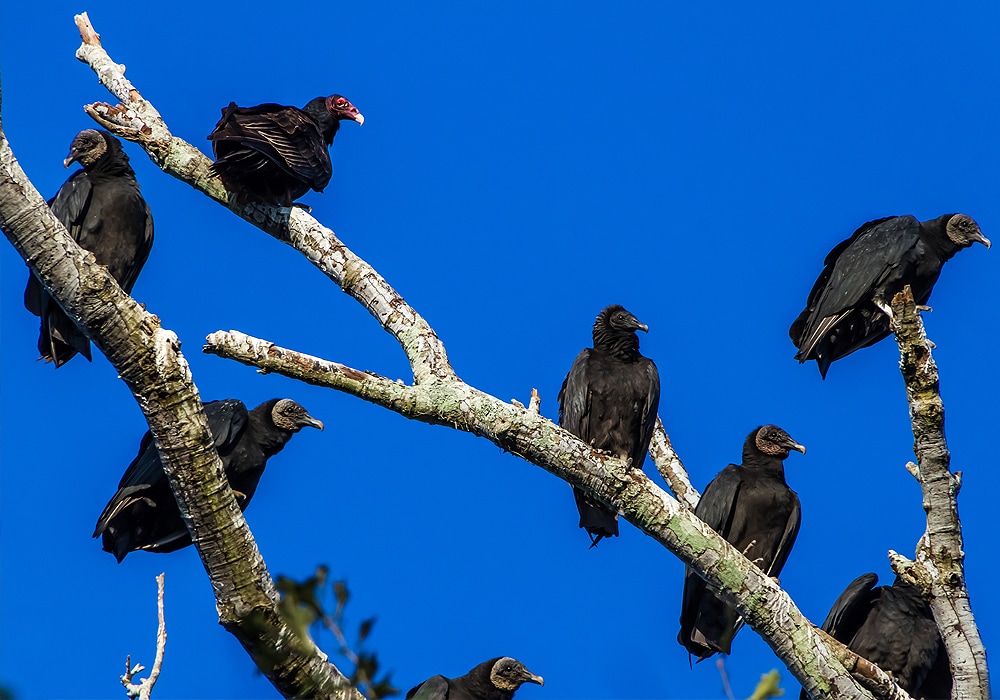
If you see that the turkey vultures like to hang out in a cluster of old, dead trees, you may want to prune its branches or cut the entire thing down.
If they’re hanging out at the cell phone tower or electrical lines next door, you might want to direct your sonic cannon that way to scare them off.
The general principle is that you need to modify, remove access, or take away the places these turkey birds like to hang out.
By doing so, you give them one less reason to choose your home and one more reason to go find somewhere better to stay.
12. Use a laser deterrent
There are a lot of vulture deterrents that make use of light, but among the most effective are those that use lasers.
Laser bird deterrents work because they emit points of light that move in unnatural ways. If you want to keep buzzards away from your house, make them think there’s something weird going on, and they’ll assume it’s dangerous and stay away.
Many devices have different light movement patterns to prevent turkey vultures and other birds from getting acclimatized to it. These also have timers that automatically turn it on and off every 1-15 minutes.

With that range, it’s difficult for birds to predict when those freaky lights will turn on, making them seek places that are always dark.
Best of all, these powerful laser lights can penetrate the darkness from up to 12,000 square feet away. This makes it great at protecting large backyards at night.
Installation and maintenance is a breeze. Just plug it in and place it on a stable surface facing the places where you see turkey vultures often. This an effective way to get rid of them with zero contact, zero harm caused, and zero toxic residues left.
13. Use predator mylar balloons
To get rid of buzzards, it helps to use deterrents that have several anti-buzzard features. Mylar balloons are a good example.
Mylar balloons are made of a special reflective, heavy-duty material that can withstand the elements and stay afloat for weeks. Predator mylar balloons deter wild turkey vultures in three ways.
- First, it uses colors and visual patterns that look like the eyes and gaping mouths of birds of prey.
- Second, they hang from strings and move unnaturally in the wind.
- And lastly, they are made of reflective material that catches the light and confuses buzzards.

Install these balloons in a strategic position to maximize their effectiveness. You can secure them on poles or pillars, hang them from a string, or let them float in your pool.
A good clue is to look for large deposits of vulture poop. Place them near these locations to prevent them from further destroying the structural integrity and aesthetic of your home.
While predator mylar birds are great for light to moderate infestations, it’s still best to use this in conjunction with other buzzard repellent methods.
14. Dispose your garbage properly
Oftentimes, the best turkey vulture repellent is the removal of something that they want. In the wild, buzzards enjoy a meal of scraps from a predator’s meal. But in urban areas, there’s a much more convenient option: trash.
If you want to get rid of black vultures, you need to get rid of vultures meals.
It’s easy to notice when you have a dead animal in your yard, but you may not be paying attention to their other sources of meat.
Scraps of meat or smelly leftovers in the trash could be the reasoning these birds are so stubbornly staying in your home.

Make sure to secure your garbage. Place your trash in a plastic bag to help contain the smell. Tie a bungee rope over your lid to prevent buzzards and other animals from opening it, or else buy a garbage can that has a lockable lid.
You can put them in racks so they can’t get pushed over. Make it a habit to hose down your garbage area every couple of weeks to wash away spills and keep the smell down.
This is not only a great way to get rid of opportunistic birds and animals but also disease-spreading insect pests.
15. Call a professional
Getting rid of turkey vultures will take time, patience, and resources. But if you don’t have the first two, you might want to call in the professionals.
Wildlife control companies have the expertise and equipment to solve your buzzard infestation problem for good. They will assess your home, ask your preferences, and study the behavior of the buzzards in your area.
With this knowledge, they’ll come up with a bird control strategy customized to your needs. If you attempt turkey control on your own, you may end up buying things that work in some situations but not in others.
In this way, you actually save money and effort by hiring professionals.
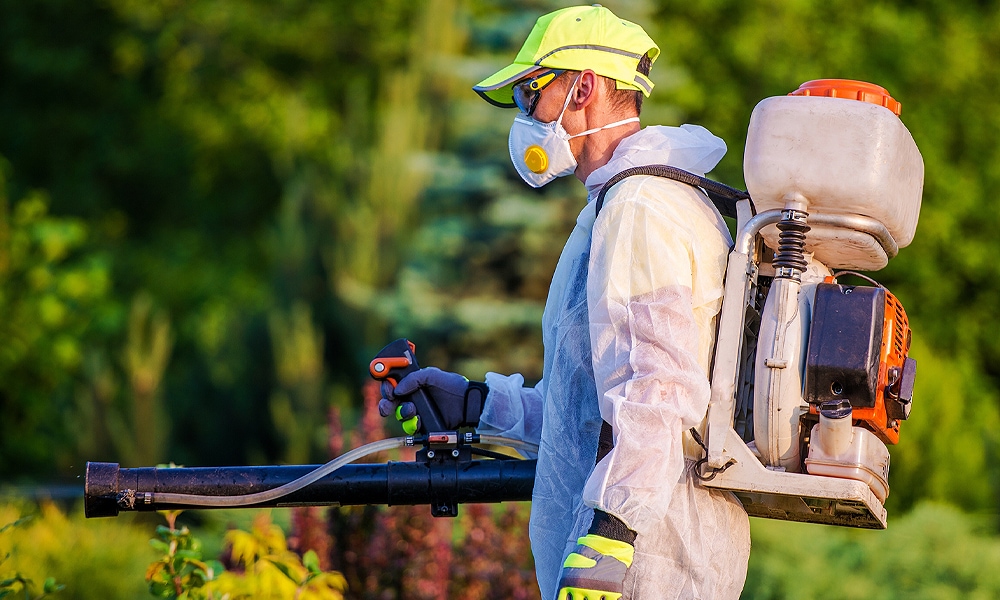
Make sure to choose a duly registered wildlife control service that is compliant with environment protection laws.
Stay away from those who use strong chemical repellents, poisons, or traps that will harm and even kill these birds.
Ditto for those who suggest destroying nests and removing eggs without proper approval from regulatory government agencies.
Just because they are pests to humans does not mean that the world is better off without them. They have important biological roles to fill, and it is our duty to respect that.
Related:

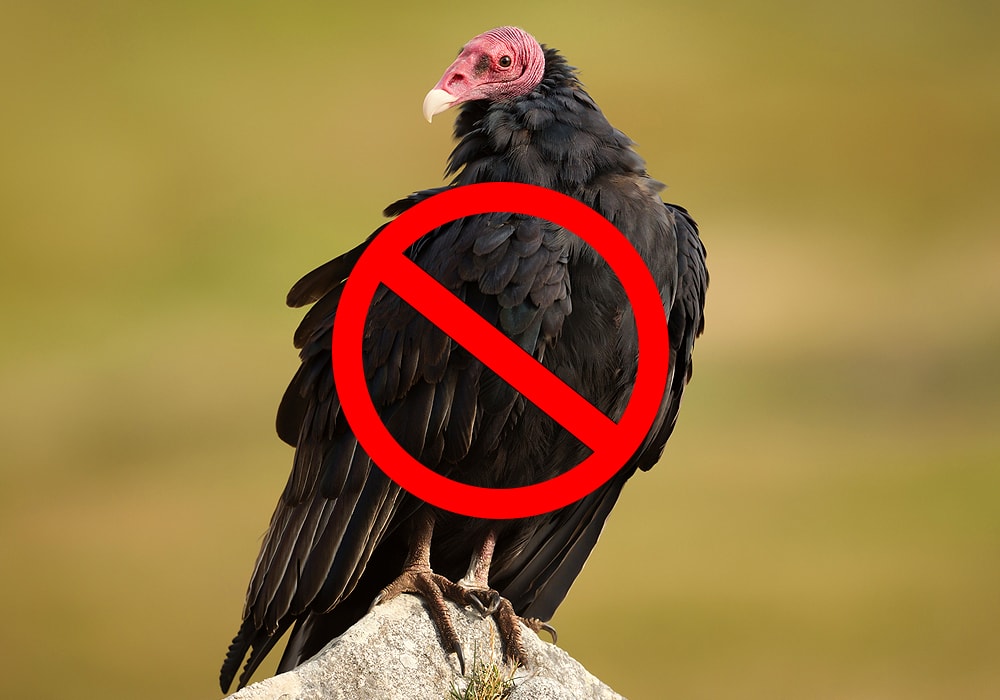
I live in a subdivision and a group of turkey buzzards are n my roof. l believe they are tearing it up, they have pulled the insulation that’s wrapped around the pipes coming out from the roof and feathers are all over the roof. l really need help for l counted 42 out there with some in the trees. Call me, please.
Turkey buzzards are landing on my pool and tearing the cover apart. I can’t get cover off. I’ve tried balloons and an owl but they come
Every morning. How can I stop them.
The issue I am having with Buzzards is at the cemetery. The Buzzards are tearing p the arrangements, pulling the flowers out of the vases, ripping up the ribbons and destroying the arrangements to a point of having nothing left to salvage.
Any thoughts on how to deter them.
Thanks,
Buzzards find meals by a super-duper keen sense of smell so I read. They can smell road-kill possum over a mile away so I read. Hence, repel them by targeting their olfactory with aromas not so delicious to them. I made the mistake of pitching out cooked food scraps out back to the possums. Not to feed them. But to avoid stinky trash. I.E. chicken bones etc. And not much or daily either. Big mistake, Little did I know it attracted pesky buzzards. They wouldn’t go away either even weeks after I stopped feeding. Hanging around mooching and started roosting. Just before sunset simply make a small smoky camp fire out back in the fire pit. They shag ass. No more roosting. For the one/two punch set out a 5 gallon plastic bucket elevated 4-6 ft. Fill 1/2 with water and add 4 cups of bleach. I have domestic animals and didn’t affect them. These two cheap tricks worked for me virtually overnight. No more buzzies and no need buying costly repellent gadgets as advertised in article. Use leftover bleach solution for laundry or whatever. Main thing is don’t make the mistake I did by throwing out food scraps. Buzzards will come. Good luck.
The best tip is to get rid of your smart meters and nearby cell towers, in order to remove the constant food source of dead and dying small mammals under these radiation sources. The vultures moved in near our condo as soon as the smart meters were installed, and never have left. Their presence indicates the presence of something dead nearby. But these are huge flocks and they never leave – they must have a good food source. They are staying for a reason.